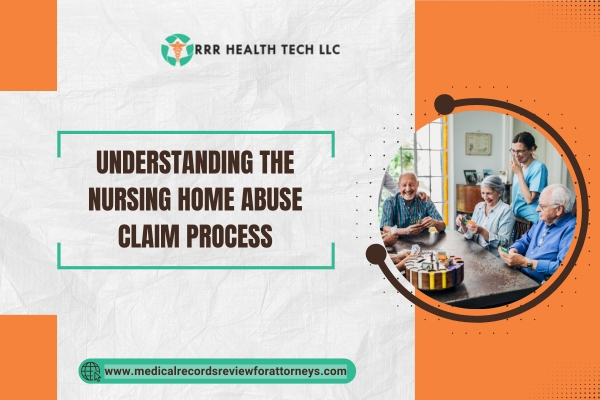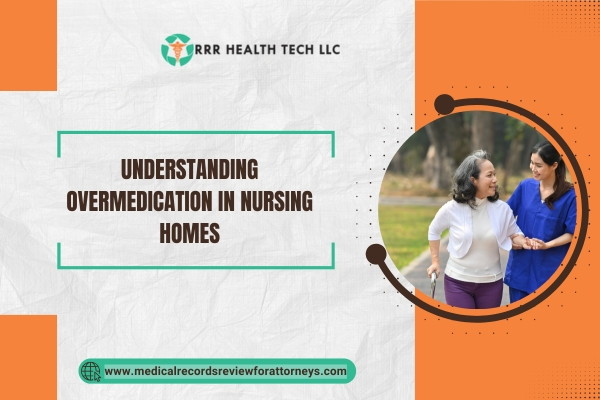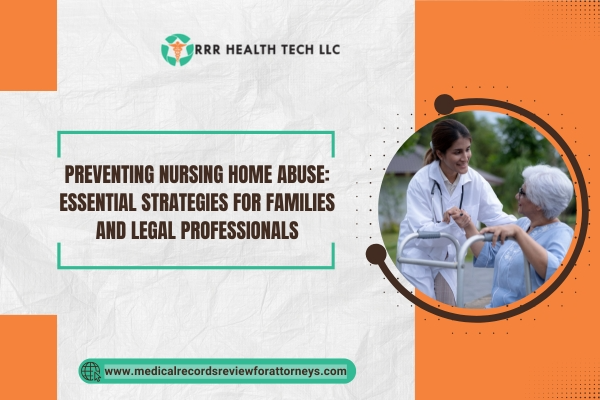
Introduction
Nursing negligence and abuse remains rampant and continues to negatively affect susceptible members of American society. It is a disturbing norm for legal professional advocates dealing with abuse victims in Ohio. In this regard, this article explains the nursing home abuse claim process in detail while also elaborating how medical records review services can help bolster the legal case.
1. Understanding Nursing Home Abuse
Types of Abuse
Nursing home abuse can manifest in various forms, including:
- Physical abuse: The use of force to inflict bodily harm or pain.
- Emotional Abuse: Verbal abuse or intimidation that inflicts psychological damage.
- Sexual Abuse: Unwanted sexual acts.
- Neglect: Failure to provide adequate care that can lead to adverse effects on the person under care
Signs and Symptoms
It is imperative to detect the signs that a nursing home abuse has taken place. Most clients show signs of behavior such as sudden change in behavior, self-isolation, and changes in their hygiene, and injuries that have no explanation behind them.
2. The Importance of Medical Records in Nursing Home Abuse Cases
What Medical Records Reveal
Medical records are critical in nursing home abuse cases. They provide a timeline of care, document injuries, and reveal patterns of neglect or abuse. Key components include:
- Admission Records: Primary health check done on the patient.
- Progress Notes: Daily routines and observations done by the nursing personnel.
- Medical Administration Records: Information regarding prescriptions with medications and their required amount as well.
How Medical Records Review Services Assist Attorneys
Medical records review services specialize in analyzing complex medical documentation. These services help attorneys by:
- Relevant Details Recognition: Obtaining vital information that is valuable and supportive to the case.
- In-depth Professional Evaluation: Contributing knowledge of care standards in the medical field.
- Make the Review Process More Efficient: Reducing the amount of time and effort spent by the attorneys.
3. The Nursing Home Claim Process
Initial Consultation
The first step is the first consultation with the family of the victim together with the attorney. In this meeting, the lawyer learns about the abuse and the various legal issues that can be addressed in this case.
Investigation and Evidence Gathering
Following the consultation, the attorney conducts a thorough investigation. This includes:
- Obtaining Medical Files: Utilizing medical records review services to study the documents.
- Listening to Witnesses: Interviewing the staff, residents or other family members.
- Experts Consulting: Using specialists in the medical field for opinions.
Filing the Claim
Once sufficient evidence is gathered, the attorney files a claim. This involves:
- Legal Document Preparation: Writing the complaint and the accompanying documents.
- Filing in The Relevant Court: Presenting papers to the court which has jurisdiction to deal with the issues.
Negotiation and Settlement
After the filing of the case my client’s attorney may start negotiations with the insurance agency of the nursing home. Most of the cases are settled out of trial that leads to some compensation to the victim of the case.
Trial Process
When no agreement can be made everything proceeds to trial. My client’s attorney would gather the evidence, call witness, and put on a thorough defense. In the end we expect to be compensated an amount to cover medical expenses and the pain inflicted.
4. Common Challenges in Nursing Home Abuse Claims
Legal Hurdles
Nursing home abuse claims can face various legal challenges, including:
- Statutes of Limitations: Each state has a limit of time for a claim to be filed.
- Burden of Proof: There is an obligation by the plaintiff to prove that abuse actually happened.
Emotional and Psychological Barriers
Always these clients and their loved ones can be very disturbed which could limit their legal action therefore with proper guidance from legal practitioners and a counsellor this can be managed effectively.
5. Case Studies
Case Study 1: Overmedication in a Nursing Home
Overview of the Case: One of the residents in a nursing home was overmedicated and as a result suffered serious adverse effects.
Challenges: The family had issues accessing medical records because they were not able to establish negligence.
Solutions: The attorney worked with a medical records review service, and alongside the MAR reviews, the service has also reported patterns of overmedication.
Case Study 2: Neglect Leading to Injury
Case Overview: An elderly person was injured due to neglect which included bedridden sores and malnourishment.
Challenges: The family faced difficulty in collecting enough evidence to prove the nursing home’s low standards of care.
Solutions: The attorney conducting the case obtained additional videographic evidence of the neglect using medical record review services progress notes and incident reports that proved the worsening of the president’s health.
6. Conclusion
The process of making, supporting, and progressing a claim for nursing home abuse is tedious and emotionally distressing. Understanding the situation at hand and the steps needed and the particular role of medical records review service providers will assist attorneys in tackling their cases more creatively and constructively. Like other professionals, lawyers should take nursing home abuse cases seriously and try to meet the existing inadequacies in outreach resources, so they can do their job well in serving these client victims.


